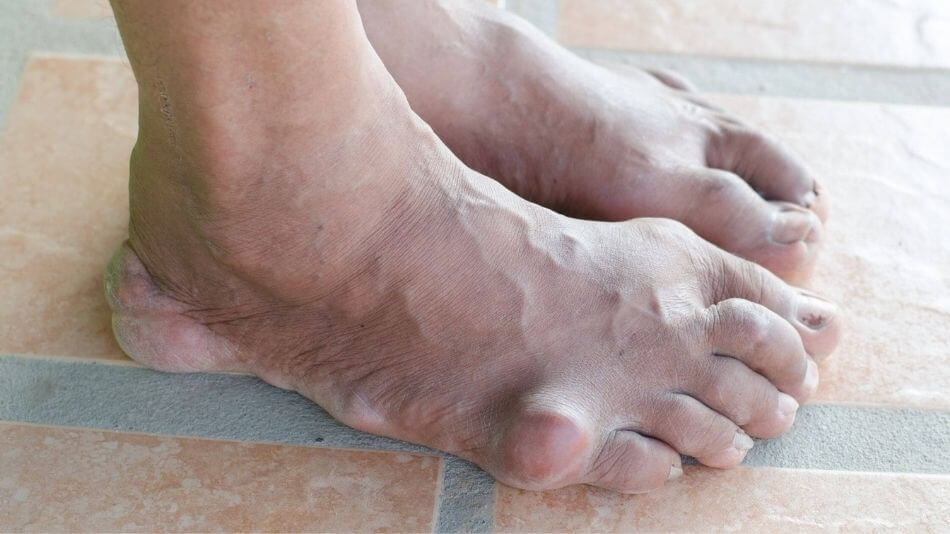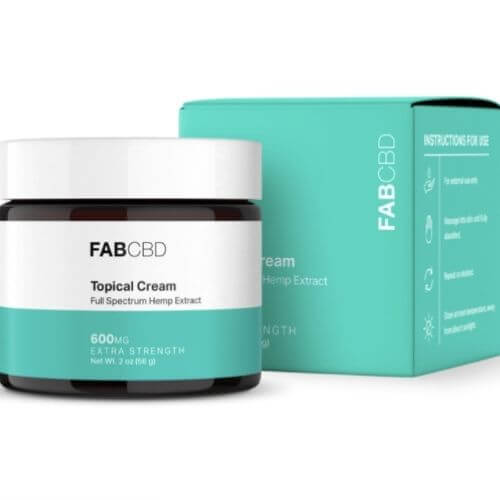CBD has established itself as a treatment option for many chronic conditions, including IBS, endometriosis, and more. But, can it help with symptoms of gout?
CBD, with some limitations, can effectively help treat gout, a chronic type of arthritis characterized by inflammation, redness, and pain. As a natural inflammation-fighter, and one that comes with little side effects, CBD can be a great option to treat gout pain naturally.
In order to understand how to best use CBD oil for gout symptoms, though, we first need a thorough understanding of what gout is, what symptoms it causes, and how to receive a diagnosis. It also helps to be familiar with just how CBD works to tackle symptoms and what sort of side effects might indicate that CBD isn’t the best tool for addressing your concerns.
FAB CBD Topical Cream
Why It’s Better Than the Rest
- 3x Stronger Than Your Average CBD Pain Relief Rub
- Full Spectrum Oil Used for Maximum Relief
- High Quality Ingredients
- 12 Month Shelf Life
- 30 Day Money Back Guarantee
Use Code “FACILITATOR25” for 25% Off
What is Gout?
Gout is a common type of arthritis (inflammatory arthritis) that occurs as a result of too much uric acid in the body. Like other forms of arthritis, gout is associated with pain (sometimes severe), inflammation, swelling, and redness.
As mentioned, a build-up of uric acid (which the body creates when it breaks down purines, often found in the foods we eat) is responsible for the development of gout symptoms.
Though some level of the purines our bodies interact with come from bodily processes themselves, diet can play a significant role in the development of gout.
Some foods, like steak, seafood, fructose, and others contain a higher amount of purines; as a result, frequent consumption of these foods leads to a higher risk of excess uric acid in the body, and thus a higher risk of developing gout.
Other risk factors for gout include:
- Obesity: Those who are overweight or obese naturally produce more uric acid, which can build up and become problematic over time.
- Sex: Men are far more likely than women to develop gout because, in general, women produce less uric acid than men. Post-menopause, though, women are more likely to develop the condition. Men tend to begin dealing with gout at a younger age.
- Medical Conditions/Medication: Some chronic illnesses or other medical conditions can exacerbate or create gout symptoms, especially in conjunction with other risk factors. Some medications may also increase the amount of uric acid the body produces.
- Family History of the Illness: If you have a family member (or members) with a history of gout, you’re more likely to develop the condition.

Gout Symptoms and Complications
Gout symptoms usually come on very suddenly, and oftentimes at night. The spontaneous and unpredictable nature of gout symptoms can make them stressful to experience and hard to deal with.
Common symptoms associated with gout include:
- Intense, severe joint pain (oftentimes the big toe, but any joint can be affected)
- Inflammation: swelling, redness, tenderness
- Discomfort (may linger for days after a flare up)
If gout progresses to a more severe stage, it can also impact your ability to move your joints normally. Additionally, a build-up on uric acid left unaddressed can cause other issues, like kidney stones.
If you think you might be dealing with the symptoms of gout, it’s extremely important that you speak with a healthcare professional. The symptoms listed above are associated with many inflammatory illnesses, so it’s not necessarily safe to assume gout is what you’re dealing with without the guidance of a professional.
Gout has no cure, but with a well thought out treatment plan, it’s possible to live a normal, healthy, and happy life while still fighting the condition.
How CBD Can Help
Dealing with the symptoms of a gout flare-up and working to prevent more in the future is often the first step of any gout treatment. Fortunately, CBD can aid in both these goals.
Because CBD has anti-inflammatory properties, it’s a great solution for treating the source of pain and discomfort that comes from gout. As is the case with other chronic conditions, CBD use (especially products that also contain THC, thanks to the entourage effect) can be a viable alternative to more conventional methods of pain management/medication.
Even if you decide to use CBD products to treat the pain and inflammation that comes along with gout, it’s still important to speak with a doctor.
CBD products are not a substitute for long-term, intensive treatment under the guidance of a professional; instead, they’re a tool you can use to help make things easier, or further relieve your pain and other symptoms.
Studies done on animals surrounding the benefits of using CBD to treat inflammation are very promising, and so is anecdotal evidence. Many individuals with chronic pain and inflammation experience lessened discomfort, better sleep, and less stress as a result of CBD usage.
To make things even better, CBD is generally very safe to incorporate into your routine.
Current Research on CBD and Gout
Because CBD is a relatively new treatment option within the medical community (though cannabis has been used for centuries for natural healing), research specific to how CBD can impact gout is still lacking.
Fortunately, plenty of research exists to illustrate how CBD can be an effective treatment plan for arthritis in general. Because gout is a type of arthritis, it’s relatively safe to assume that many of these phenomena may be relevant to gout, too.
Current research not only demonstrates that CBD can help relieve the pain and inflammation that come along with arthritis, but also shows that CBD can help prevent certain types of arthritis from getting worse.
It’s believed that CBD may help protect joints from further injury or damage, which is especially significant given how easy it is to use, how versatile it is, and the fact that it carries minimal adverse side effects.
There is a large body of scientific studies demonstrating positive effects of CBD on arthritis and arthritis symptoms. You can click here to see more.
In regards to research examining how CBD impacts inflammation, studies done on animals on the subject are very promising, and so is anecdotal evidence.
Many individuals with chronic pain and inflammation, whether they exist as the result of gout or not, experience lessened discomfort, better sleep, and less stress as a result of CBD usage.
Using CBD Oil for Gout
Many inflammation-producing illnesses can be treated with CBD oil; gout is no exception. For many looking to use CBD, the most effective product to use is CBD oil, the purest form of CBD on the market.
There are many ways to use CBD oil for gout, but a popular method is to rub the product into the skin surrounding the affected area (and into the joint itself).
CBD oil can also be consumed orally, though it may take longer to feel any effects.
Different methods of consumption may be more successful than others, so if you do decide to use CBD oil for gout (or hemp oil for gout), don’t be afraid to experiment.
How long does it take for CBD oil to work for joint pain?
The effects of CBD oil are generally noticeable after about 15-20 minutes when ingested sublingually.
How quickly you feel the results of CBD depends on a variety of individual factors, specifically due to your consumption method, but you can likely expect to experience pain relief within an hour of consumption.
CBD oil that is used otherwise (topically, for instance) can take 1-2 hours to kick in. This estimate is also accurate for edible products like capsules.
Sublingual consumption is one of the most popular ways to utilize CBD for pain relief precisely due to its fast-acting nature.
Depending on how much CBD you consume, you can expect the pain-relieving effects of your product to last anywhere from two to six hours.
Possible Side Effects
As is the case with anything we put into our bodies, it’s possible to experience some negative side effects while using CBD. Though this is pretty uncommon, it’s still possible, so it’s important to be aware.
Potential side effects of CBD oil include:
- Nausea
- Fatigue/Drowsiness
- Diarrhea
- Dry mouth
If you experience any of these symptoms, especially if they occur more than once, it may be wise to speak with a doctor about whether or not CBD is a good option for you.
Takeaway
Gout’s signature symptoms (pain and inflammation) may have met their match; CBD is a great treatment tool for all of the main symptoms of gout, and it can also be an excellent way to manage stress and discomfort.
Still, CBD use, while helpful and relieving, doesn’t replace the care of a healthcare professional. Because gout can worsen over time if left untreated, it’s important to ensure that you take the proper steps to address it sooner rather than later.
Because there is no cure for gout, the goal for individuals with the condition is not to fix it, but to manage it.
Fortunately, CBD helps manage gout symptoms quickly, efficiently, and safely, so ultimately, it is generally a wonderful option for those dealing with the illness. For CBD oil recommendations and more, be sure to check out our directory of reputable, effective, and high-quality CBD products here.










